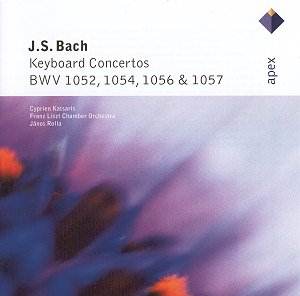During the 1730s Bach became involved in the activities
of the Collegium Musicum in Leipzig, which gave him the opportunity
to perform and compose concert music for the first time in some ten
years. One result, perhaps the most important, was his series of keyboard
concertos.
Bach's aim in his keyboard concertos was to give priority
to his own prowess as a harpsichordist, and in taking adapting existing
compositions (generally, though not always, his own) he sought to modify
the solo line to the needs of the new conditions, while allowing the
orchestral accompaniment to remain as close as possible to the original.
In all, it seems that he wrote fourteen concertos for one, two, three
or four harpsichords, and of these only one, the C major Concerto for
two harpsichords, BWV1061, was a new composition. The remainder were
originally concertos for other solo instruments, most commonly the violin,
written during 1717-23, the years of Bach's previous appointment as
kapellmeister to Prince Leopold of Anhalt-Cöthen.
This collection performed by the pianist Cyprien Katsaris
gathers some splendid examples from this repertoire. Two of these pieces
will be familiar to listeners who know the E major Violin Concerto (here
the D major Concerto, BWV 1054) and the Fourth Brandenburg Concerto
(here the F major Concerto, BWV 1057). There is no problem about any
of this. Like so many composers, and rather more than most, Bach was
the consummate professional, and he used is own stock of material to
bring fresh opportunities as and when required. And the word 'fresh'
applies to these sparkling performances. For those who wonder about
playing Bach on the piano rather than the harpsichord, this disc shows
just how well the music can sound. The recorded balances are just right,
so too the tempi and phrasing. Some purists may object, but the music
works supremely well in these versions.
While Katsaris is the undoubted star of the show, leading
with lively virtuoso playing, the Franz Liszt Chamber Orchestra (Budapest)
play with equal urgency and vitality, skilfully directed by János
Rolla. The vivid sound does them justice too. The only disappointment
here is the rather slender accompanying booklet, not as bad as some
but still short on information and badly designed. However, these are
marvellous performances of marvellous music.

![]() Cyprien Katsaris (piano)
Cyprien Katsaris (piano)
![]() APEX 09274 08192
[63.13]
APEX 09274 08192
[63.13]